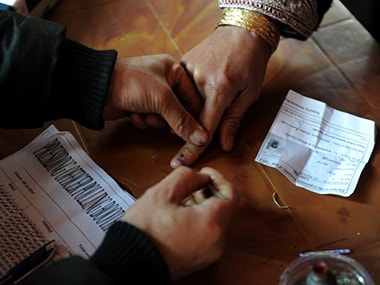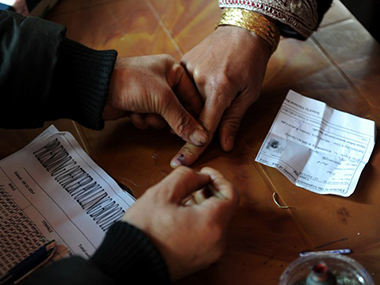Jammu and Kashmir resembles a messy marriage market after the failure of voters to do the matchmaking. Impatient, drooling grooms are competing with each other to get married and to the merriment of those watching, the prospective brides are equally eager to get hitched with whoever comes up with the best proposal. In the eagerness to jump into bed, everything-ideology, political differences, pre-poll animosity, manifestoes-has been discarded like inconvenient clothes. Had this not been politics, the rituals could have easily passed off as a corny scene from Grand Masti II. But unfortunately this is politics. [caption id=“attachment_2017101” align=“alignleft” width=“380” class=" “]  Representational image. AFP[/caption] A year ago, voters of Delhi had thrown up a similar conundrum for the BJP, Congress and Arvind Kejriwal to solve. Isn’t Srinagar today the Delhi of 2013? Should the BJP, PDP and NC learn from another groom who said ‘qabool hai’ and ruined his future and reputation? Back then also we had a quick-fix-though the ‘pehle-aap’ tehzeeb of Delhi has been replaced by the crudity of ‘me-first’ in Kashmir- but the government did not last for long. Will an opportunistic alliance based on principles that define predatory politics last longer in J&K? An ideal alliance is based on shared interests, ideology, deep trust and long-term commitment to common goals. In J&K nothing is common between the three parties- BJP, NC and PDP- aggressively chasing each other. Prima facie, the new government in J&K appears doomed. Yet, the government, especially with BJP as the dominant partner, could last longer than AK-49. The reason: It would be based on greed, fear and mutual distrust. GREED: It is immaterial who partners the BJP in the state. Both the PDP and the NC would have to make similar compromises and bargains for survival. Both know that they won’t get a penny from Narendra Modi if his party is unhappy in the state. This is primarily the reason the PDP is not even talking about an alliance with the Congress. The dynamics of the outgoing Congress-NC government also suggest the BJP will always have the upper hand in J&K. While Omar Abdullah was in power, the Congress got its way in Srinagar on important issues like AFPSA and amendments in the Panchayat Raj bill because it could always bully the CM with the threat of holding back crucial funds. FEAR and DISTRUST: The BJP has to make inroads into the Valley to fulfill its dream of Mission-44 in the future. In this election, Modi managed to convince just two per cent voters in the Valley to support his party; his candidates lost their deposit in all the seats except one. It has nothing to lose in the Valley. But the two regional parties are afraid that they can retain their influence over the Valley only by becoming part of a government and stay in the coalition. Whoever stays out will find it difficult to survive for six years, especially if the BJP continues its efforts to get a foothold in the Valley. The BJP’s other advantage in the state is that ‘all options’ are open for it. It can choose between NC and PDP, influence independent MLAs and even engineer defections in the other three parties. In J&K, even 50 per cent MLAs can break away from their party, unlike other states in India where a 2/3rd majority is mandatory for a legally valid split. So, NC and PDP will always be afraid of losing their MLAs to poachers from Delhi. This will force them to keep cordial relations with the BJP. Since we started with the wedding analogy, the conclusions are also based on it. One, the BJP will be the dominant partner in any alliance in J&K. Two, the alliance will last longer than the other similar marriage of inconvenience in Delhi, between Kejriwal and the Congress. Three, the government will survive because the Centre will use money both as a threat and a reward to ensure its greedy ally doesn’t walk out. Four, the BJP will immediately find another suitor if the ally tries to break away. So, fear and envy will keep the government going as long as possible. In conclusion, the alliance in Kashmir, however unholy it may appear, has good chances of going the distance. The impatient grooms and brides running around in Srinagar’s power corridors would succeed where an equally impatient Kejriwal failed.
J&K resembles a messy marriage market after the failure of voters to do the matchmaking. A year ago, voters of Delhi had thrown up a similar conundrum for the BJP, Congress and Kejriwal to solve.
Advertisement
End of Article


)
)
)
)
)
)
)
)
)



